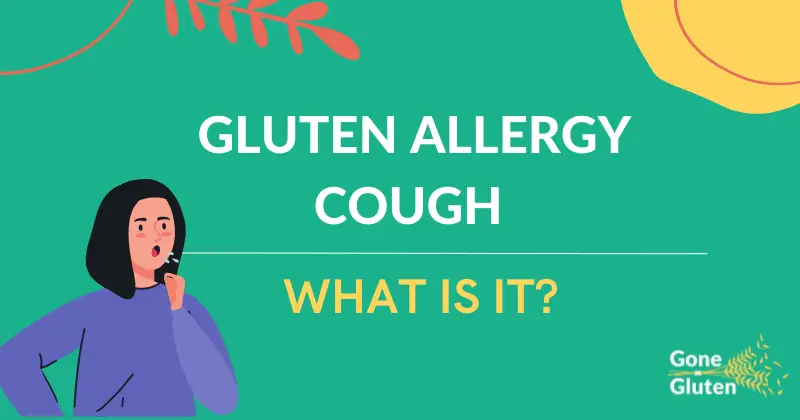Gluten can do numerous things to your body when you have a wheat allergy, sensitivity, or celiac disease. I’ve experienced and heard my fair share of symptoms of gluten intolerance.
I dug deep into research on the handy dandy world wide web and discovered the answers.
Until recently, I was unaware of a gluten allergy cough; what is it?
People with gluten sensitivities produce an Immunoglobulin E antibody, thus causing an allergic response when consumed or inhaled, such as a cough.

Who Is Most Susceptible to Gluten Cough?
Individuals who suffer from baker’s asthma, the name given to those who have inhalation sensitivities to wheat or gluten, and those diagnosed with chronic obstructive pulmonary disease are vulnerable to developing gluten cough.
Those with celiac disease are more susceptible to airway inflammation attributable to gluten consumption and thus a cough.
Check out what Dr. Osborne has to say about gluten allergy cough.
What Types of Foods Are Most Apt to Cause a Gluten Cough?
If you suffer from gluten cough, one of the best ways to minimize its impact on your life is by reducing your intake or eliminating certain foods from your diet. There’s no definitive list of foods containing gluten; however, some of the ones that generally include this allergen protein are:
- Any baked goods, like bread, cakes, pastries, pies, crackers, and croutons
- Breakfast cereals
- Anything containing malt, such as vinegar or syrup
- Meat substitutes
- Pasta
Alcoholic beverages, including beer, also generally contain gluten. Don’t worry; there are a ton of tasty gluten-free beers on the market today.
Additional Gluten-Containing Foods that May Cause a Cough

Some other foods that may also contain gluten that could lead individuals with wheat allergies to experience a persistent cough include:
- Deli meats
- Sauces, salad dressings, or gravies
- Chips, including tortilla or potato varieties
- Stuffing
- Hotdogs
- Granola
- Candy
- French fries
- Stuffing
Medical evidence suggests that not just any gluten-containing products cause gluten cough. Wheat is primarily responsible for this condition.
Wheat is one allergen that the United States Food Allergen Labelling and Consumer Protection Act of 2004 requires packaged food product manufacturers to list on their ingredient labels. You should carefully review packaging before purchasing to determine whether it contains wheat.
Other Gluten-Rich Products that May Cause a Cough
If you have a wheat or gluten allergy, just watching your diet may not be enough. Makeup, cosmetic products, and Play-Doh may also contain wheat. These substances’ inhalation or ingestion (most commonly with lipstick) could lead to a gluten allergy cough.
Why Does Wheat Consumption or Inhalation Cause Gluten Cough?

Gluten is only one of four proteins present in wheat. Globulin, gliadin, and albumin are the other three. Anyone with such an allergy may suffer an adverse immune reaction when they inhale or consume the wheat proteins, resulting in histamine release.
At best, someone may experience a runny nose or cough. In rare cases, a wheat or gluten sensitivity can cause a potentially deadly anaphylactic shock.
What Are Signs of a Wheat Allergy?
According to the American College of Allergy, Asthma & Immunology (ACAAI), some of the most common symptoms that individuals with wheat sensitivities experience include:
- Mouth swelling, wheezing, or breathing problems
- Abdominal cramping or discomfort, indigestion, nausea, vomiting, or diarrhea
- Headaches
- Sneezing or nasal congestion
- Skin rash or hives
The emergence of a cough attributable to wheat or gluten allergy is rare. However, it’s best not to play doctor and try to self-diagnose. Anaphylaxis is a serious, adverse immune response that may affect a person’s ability to breathe or cause them to go into shock, putting them at risk of death.
How To Get Rid of a Gluten Allergy Cough

Medical research and patients’ anecdotal information suggest that the best approach for tacking gluten cough is eliminating the allergen from your diet.
The ACAAI notes that individuals with wheat or gluten sensitivities might want to consider taking corticosteroids or antihistamines in addition to avoiding trigger foods.
Do Wheat Derivatives Cause Gluten Cough Too?
Some medical researchers even suggest that removing wheat-based products from a gluten cough sufferer’s diet isn’t enough to put an end to that pesky gluten allergy cough. They recommend removing all wheat derivatives, including:
- Spelt
- Farro
- Bulgur
- Semolina
- Durum
These same medical providers warn that removing wheat products isn’t often enough to do away with gluten cough. They note that patients must often eliminate all gluten-containing products, including barley and rye, before their cough ultimately subsides.
What Gluten-Free Alternatives Exist to Wheat Products?

While a gluten-free diet can be intimidating at first, it is becoming easier and easier. Today there are plenty of gluten-free products on the market. How.
The thought of sitting down with your children and opening up a can of Play-Doh may also seem impossible. So too may the idea of putting on makeup to make yourself feel good.
You don’t have to give up on all of this, though.
When recipes call for wheat-based flour, you can substitute alternative ingredients such as:
- Rice
- Corn
- Tapioca
- Buckwheat
- Quinoa
- Potatoes
- Cornmeal
Also, it may be worth it to browse the different options at your local store more closely. If you examine the product labeling, you might notice many gluten-free options for baking essentials like all-purpose flour. You can find gluten-free “lookalikes” for your favorite condiments or snacks as well.
And, if you can’t find wheat-free Play-Doh on the market, then you might decide to make your own using one of the wheat alternatives listed above.
As for cosmetics, look a little more closely at product packaging next time you’re at your local drug store or shopping online. There are wheat and gluten-free brands on the market too.
Wrapping Things Up
Reactions to gluten come up in many ways, a nasty cough being one of them. It’s always recommended to seek medical advice; however, if you’ve had a lingering cough, your diet could have something to do with that.
To learn more effects of gluten, check out this Gone Gluten article.



